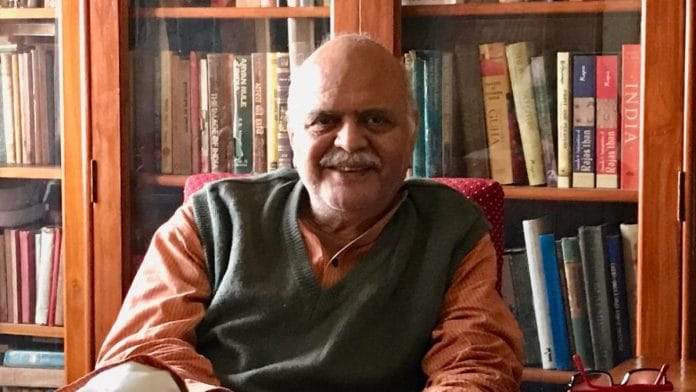A 26-year-old student from Lucknow, Saleem Kidwai, was revelling in the freedom of Canada’s underground gay bar when it was raided by the police in a military-style operation. The 22 October 1977 Montreal Raids were a significant event in Canada—146 men were picked up by the police. Kidwai, who was doing his PhD at McGill University at the time, was one of the men.
The experience, he later recounted, “changed his life in many ways”.
The crackdown galvanised queer activism in Canada. But for Kidwai, it was personal. He abandoned his PhD and returned to India. And so began a new chapter in his life, one dedicated to challenging society’s view and advocating for the rights of the LGBTQ+ community in India. The harsh reality he faced in Canada made it clear that if he wanted to contribute to meaningful change, it would have to be in his own country.
“I had realised that in spite of laws, or their absence, freedom for me meant living my life according to rules I made for myself. I also knew well that it was not going to be easy. If I had to contribute to change, I preferred to do it at home,” he said.
The gay icon
Kidwai became one of the first scholars in the Indian academic community to vocally fight for queer people’s rights. He translated forgotten works on same-sex love. He founded the queer space, Humrahi, in New Delhi.
In his 2019 book Gay Icons of India, poet Hoshang Merchant called Kidwai, “indisputably the intellectual voice of India’s gay history, especially its Urdu literature and Muslim life.”
The arrest of four men from his hometown in Lucknow in 2021 under Section 377 of the Indian Penal Code was the catalyst for the seminal book, Same-Sex Love in India: Readings from Literature and History, which he co-authored with Ruth Vinita. The book, which uses empirical evidence from the early Puranic period to show how same-sex relationships were not just accepted but celebrated in India over 2,000 years, motivated the country’s LGBTQ+ community. It was the British who introduced Section 377 to outlaw same-sex relationships.
Senior lawyer Anand Grover, one of the advocates who fought to decriminalise homosexuality, called it “The Bible” for the movement. When the Supreme Court decriminalised Section 377 on 6 September 2018, the book found a mention in the judgment.
Born in Lucknow, Kidwai spent his teenage years in Delhi where he enrolled in Delhi University. His friends remember him as an ‘icon for sorts’.
“He could be very social and also very private. He enjoyed a quiet popularity,” Shohini Ghosh, professor and filmmaker, told ThePrint. Some of his closest friends who influenced his life included classical singer Begum Akhtar and Kashmiri poet Agha Shahid Ali. Ghosh, however, reflects on a lingering regret. “Saleem Kidwai never wrote about his relationship with Agha Shahid Ali or their shared admiration for Begum Akhtar though being uniquely positioned to author a definitive biography of Akhtar or Shahid.”
And while his reticence leaves a void, she argued that it also emerged from a sense of deep ethical responsibility.
“Does the right to tell your own story also give you the right to reveal something about another person’s life without their active consent? These questions haunted Saleem whether he was writing history, biography, or autobiography. In an age of reckless revelations, Saleem exercised ethical restraint,” Ghosh added.
Also read: Anand Bakshi’s lyrics captured love, loss, yearning for home—They made him a ‘people’s writer’
The fight for queer rights
Kidwai’s contributions extended beyond queer studies. His academic work on medieval history and the tawaif tradition—courtesans of the Mughal era—was unparalleled. He maintained personal connections with figures like Begum Akhtar and Malika Pukhraj and later translated their works.
But it was Same-Sex Love in India that helped bolster the LGBTQ+ movement in India. Before its publication, the prevailing conservative sentiment dismissed same-sex love as a foreign import, despite evidence to the contrary.
Kidwai and Vanita’s groundbreaking anthology, published in the US in 2000 and 2008 in India, challenged this misconception by revealing a rich history of same-sex love rooted in India’s diverse literary and cultural traditions. Their work highlighted the historical presence of homosexuality across Sanskrit and Perso-Urdu traditions, including medieval Sufi poetry and modern fiction.
“I really admire the kind of tour de force that Kidwai was and how he was writing about queer history at a time when that was not really done,” activist Mario De Penha said. In his tribute to Kidwai, he wrote in a 2021 article after Kidwai’s death. “Queer people wielded the book as a shield against bigots, who found our identities vulgar. It made Ruth and Saleem our spokespersons and champions; it made them beloved.”
As a fellow activist, Penha valued Kidwai’s dedication to the queer movement and his insightful contributions to the Section 377 case. They met around 2005 through a mutual friend.
“Salim’s guidance, especially his emphasis on understanding the impact of one’s work, and his grace in handling disagreements, profoundly influenced me. We didn’t always agree on everything. But he was always a gentleman and an empath,” said Penha. The two did not always see eye to eye. “But he always nurtured me as a student and was able to take disagreements without it affecting his ego. It’s a very rare quality to have and he was a pretty incredible friend to also have.”
Kidwai’s death on 30 August 2021 sparked a wave of tributes reflecting on his profound impact on the queer community. While he was a lifelong advocate for equal rights, Ghosh recalled Kidwai’s response to the rise of anti-Muslim sentiments in India under the Modi government. In a particularly troubling exchange, Ghosh had reassured him that things would eventually change. Kidwai’s response, however, was like a poignant premonition.
“I know that, but will I be alive to see it?” he asked.
(Edited by Ratan Priya)






